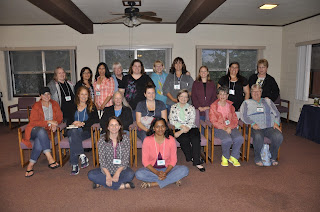Some of us seem to have given up hope that we can do anything about our inner character. We truly believe that transformation must be a supernatural act of God on our heart if we will ever be changed. We've gotten on with our lives and hope that someday, the Holy Spirit will bring to completion the work He has begun.
Others of us may roll up our sleeves and set out on a journey to become like Christ. Ben Franklin writes in his autobiography about how he "conceiv'd the bold and arduous project of arriving at moral perfection. I wish'd to live without committing any fault at any time...I did not see why I might not always do right and avoid the wrong. But I soon found I had undertaken a task of more difficulty than I had imagined...I concluded, at length, that the mere speculative conviction that it was in our interest to be completely virtuous, was not sufficient to prevent our slipping; and that the contrary habits must be broken, and good ones acquired and estabished, before we can have any dependence on a steady, uniform rectitude of conduct." So Ben Franklin conceived of a method. But after years of trying, he writes:
"This article, therefore, cost me so much painful attention, and my faults in it vexed me so much, and I made so little progress in amendment, and had such frequent relapses, that I was almost ready to give up the attempts, and content myself with a faulty character in that respect, like the man who, in buying an ax of a smith, my neighbour, desired to have the whole of its surface as bright as the edge. The smith consented to grind it bright for him if he would turn the wheel; he turn'd, while the smith press'd the broad face of the ax hard and heavily on the stone, which made the turning of it very fatiguing. The man came every now and then from the wheel to see how the work went on, and at length would take his ax as it was, without farther grinding. "No," said the smith, "turn on, turn on; we shall have it bright by-and by; as yet, it is only speckled." "Yes," said the man, "but I think I like a speckled ax best." And I believe this may have been the case with many...they concluded "a speckled ax was best."
Franklin reflects: "I never arrived at the perfection I had been so ambitious of obtaining, but fell far short of it, yet I was, by the endeavour, a better and a happier man than I otherwise should have been if I had not attempted it."
Franklin's approach seems exhausting -- and completely focused on
external behavior. When externals are the main focus, spiritual formation doesn't really happen. As Paul writes to the Colossians, ""Do not handle! Do not taste! Do not touch! These regulations have an appearance of wisdom, butthey lack any value in restraining sensual indulgence." (Col. 2:20-23) It's the
inner life that counts -- that's where spiritual transformation must occur. But how?
What is your understanding of spiritual transformation? How do we walk in the path of righteousness? What is our role in putting to death the old man, and putting on the new?
>


































